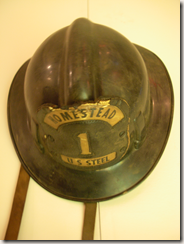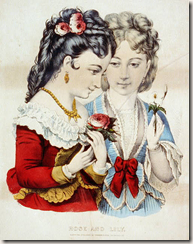The Real Enemy of the People
By John Taylor; 2010 Nov 02, Ilm 18, 167 BE
Extremes and extremism divide and conquer efficiently, whereas Flora Tristan's message of moderation was too kind, too womanly and far too conciliatory. She called for a union of workers, not a violent slave revolt. She called for constructive cooperatives, not forced equalization. She believed in God, whereas Marx and Engel were atheists. Worst of all, Flora Tristan believed that the real enemy of the working class is poverty and ignorance.
She declared that in this fight all can participate. Workers, as the main victims, have the primary responsibility to advance their own lot, but Flora Tristan would have every level of society invested in their liberation. Since it was only war in a metaphorical sense, nobody died, no blood was spilled and everybody won. Victory would come of group study and by putting the manual skills of workers to work constructing what she called worker's palaces, cooperative social service enterprises in every locality. Tristan actively sought contributions for worker's palaces not only from laborers themselves but also the king, the nobility, intellectuals, artists, the church and business leaders. A large part of her manifesto, The Worker's Union, consists of letters of petition asking for moral and financial support from the various elements of society.
In light of subsequent events, outlined last time, the ruling classes would have been wise to heed her appeals and let workers share power. It would have been far cheaper to build palaces to manual labor than to soak workers until revolt soaked the streets in blood. Had she lived long enough to forge a Worker's Union and enlist the entire society in building palaces, there would have been no bitter aftertaste, no class war, no endless struggle, no chains to throw off.
Casting Off the Chain Paradigm
By contrast, the Communist Manifesto made the insulting assumption that workers are slaves, and, worse, that their only way forward is to think more slavishly than before. Workers can only liberate themselves by violent overthrow of the government, as the slaves of Haiti had done, and by forced appropriation of the means of production, as was later done in the Soviet Union. All-too-typical males, Marx and Engels stripped Tristan's plea for cooperative activism and religiously inspired socialism of its essence, an all loving God. They promoted a specious but stultifying and reductionist belief that capitalist exploiters care nothing for their fellow man. Human nature is greedy for material goods, and hates mankind, body and soul. As it went viral, it became a self fulfilling prophesy that the elite will do what nature intended, enter into an endless death struggle of oppressed proletarians pitted against their vicious oppressors, the bourgeoisie.
Flora Tristan treated workers as free men and women, capable of learning, of carrying their own weight and building up social support mechanisms on their own. Her religious convictions taught that the way to brighten a dark room is by "shining your light before men." Ignorance, iniquity and sharp class differences vanish as soon as laborers gain the knowledge and wealth to become entrepreneurs and owners themselves. As they learn to share in natural resources and run the means of production, ownership and profits will be distributed equitably, without violent struggle or confrontation.
For Flora Tristan, slaves, including wage slaves, are liberated by knowledge, especially by educating their own children. She would have had the schools housed in Worker's Palaces run by the best teachers, so that parents from the business class and the nobility would have wanted their own children enrolled there too. In this way, increased education would cast off workers' poverty and indigence in a generation or two. The lot of girls and women would have improved even more, and their influence would increase. The home is where educated homemakers tend to have the most benefit to society, as Tristan herself pointed out.
"Woman is everything in the life of the workers. She is their sole providence. If she fails them, everything fails them. Consequently it is said: `It is the woman who makes or unmakes the household,' and this is the exact truth; that is why a proverb has been made of it. But what education, what teaching, what direction, what moral or physical development does the woman of the common people receive? None." (Translated by Doris and Paul Beik, http://www.mtholyoke.edu/courses/rschwart/hist255/at/tristan_text.html)
Recent statistical studies have confirmed Tristan's intuition in this respect. As soon as potential mothers become literate, in whatever nation, economy or culture they may live, there is a strong echo effect through several subsequent generations, improving everything from child mortality to income to social mobility. In spite of this clear benefit, Tristan's complaint that homemakers are left on their own is still largely true today.
Class Struggle As Red Herring
An unnoticed effect of radical Marxism was the elbowing out of family and religion. Traditionally faith groups and extended households took on many responsibilities for social support, such as educating children and caring for the aged. Communism and the threat of it set worker and owner at each other's throats; this distracted public attention and allowed a power vacuum to form. Opportunistic nationalist dictators, of whom Louis Napoleon of France was only the first, centralized power while ingratiating themselves by doling out what the people had before done for themselves. Slowly, the full range of social services were appropriated by a monolithic state. Even in parliamentary democracies the role of nanny shifted to large, faceless professional bureaucracies.
Worst of all, in spite of all the squabbling the rights of workers have still not caught up with Tristan's vision.
To this day, a single workplace constitution has yet to be officially adopted. Many workplaces are unionized but there is no overall union of all workers, as Tristan envisaged. Employees still rarely have a say in who leads them, or in how their company is run. They are laid off without accountability. Workers in wealthy nations compete with prison labor in authoritarian economies. While these workers are treated relatively well, on a global level the vast majority of workers are if anything worse off than in Tristan's time. Bosses exploit and bully them with impunity. In a pinch corporations can escape responsibilities simply by crossing the border, taking the jobs along with them. Wage gaps and concentration of ownership have worsened. At the same time, the basic right of humans to own and manage the planet's resources has been blocked for decades by a tiny elite with hegemony over the lion's share of the world's wealth.
If Flora Tristan's vision had caught the public imagination, everyone would be on the same side. Workers and owners would earn a fair share of the profits in whatever workplace they serve, and both would have a say in decision making. Eventually, everyone would become a worker, and for that matter everyone would become an owner and manager too. Rich and poor would be trained at a palace elementary school, and taught a skilled trade by local journey-persons from early adolescence. Young people who demonstrate a desire and ability to enter a profession could then pay for their continued education with wages from their original trade, without getting into debt. This would leave no room for rebellion or forced equalization -- basic characteristics of Marxism.
Tristan's palaces would be located in the center of the local scene. Families, religion and every community group would both contribute to and benefit from them. Financed and run by workers themselves, workers palaces would stand as prominent declarations that everybody works and all benefit from the right and obligation to be employed. Local people would be directly involved in palace service projects in a variety of roles, and at every stage of life. Each neighborhood would display a palace as its badge of honor. As cooperative, not-for-profit institutions, they would avoid bureaucracy, buffer the economy in bad times and gently spread the wealth around. The widening gulf between worker, owner and manager, would start to narrow and disappear.
In spite of all this, Flora Tristan was no economist. She believed that women are at the heart of the issue. They have been called upon to moralize the world, and it is up them to make this vast project of reconstruction possible. Let us talk about this in detail next time.
- ::



No comments:
Post a Comment